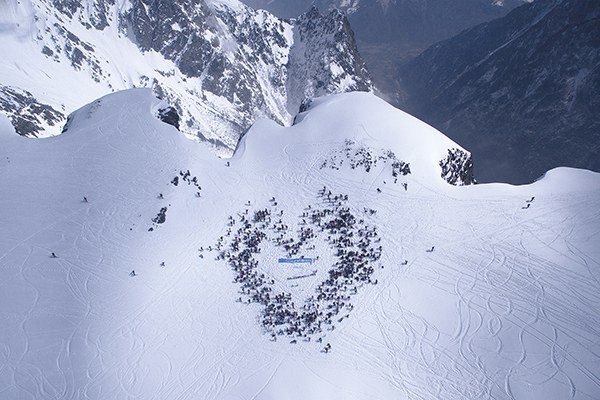News
Better protection for natural spaces

It was probably the largest protest action ever to take place on a mountain in the French Alps: in mid-March 2016 over 600 people formed a giant heart below the 2400-metre peak of Les Vans in the French Belledonne mountain range. They wanted to show their disapproval of the planned expansion of the Chamrousse skiing area southeast of Grenoble. The Vans Valley forms part of the “Natura 2000” network of protected areas. The action was called by twenty environmental associations, including CIPRA France, with the project being deemed disproportionate. Those responsible denied the reality of climate change and prevent all-year-round tourism.
Bavarian Alpine Plan under pressure
Elsewhere too, citizens and environmental organisations are protesting anew against building projects in pristine or largely unspoilt areas, for instance on the Riedberger Horn in Germany, which is covered by a protected zone in the Bavarian Alpine Plan, or against the linking of the Pitztal and Ötztal glacier skiing areas in Austria. CIPRA Germany, CIPRA Austria and CIPRA South Tyrol have listed on a map around 40 planned aerial ropeway projects and ski piste developments in their respective regions.
At the end of March, prior to a conference on spatial planning to be held in Murnau, Germany, these three representative bodies appealed to the Alpine countries to ban all future major extensions to skiing areas. Such extensions would simply lead to ruinous international competition, destroy the landscape and nature and make no contribution to the development of a sustainable economy. Internationally co-ordinated spatial planning is what is required: as Peter Hasslacher, head of CIPRA Austria, explains: “We are not making any headway with the concentration on species protection. We need spatial planning to safeguard areas that have not been or have hardly been developed.”
Nature is priceless
CIPRA International added its voice with an open letter to the Alpine states, presented the day before yesterday to the German Secretary of State Rainer Bomba at the Murnau conference on spatial planning. CIPRA International supports the efforts of the Alpine states to achieve an integrated and multi-sector approach, as set out in a declaration that was discussed at the conference. Only such an approach could prevent special interests from coming before the public interest. But, as the letter continues, it is unfortunate that, in spatial planning procedures, “political or business interests were often given more weight than values that are not measurable in monetary terms, such as quality of life, landscape, biodiversity or ecological networking”. Proof is provided by the decline in variety, open spaces and corridors. “It gets forgotten that nature is not just one factor among many affecting our lives, but the source, inspiration and framework of every life.”
Sources and further information: www.cipra.org/de/cipra/oesterreich (de), www.cipra.org/de/positionen (de, fr, it, sl), www.mountainwilderness.fr/images/presse/2016/CP-Rassemblement-Vans/DP_Vans.pdf (fr), https://vimeo.com/159052489 (fr)

